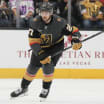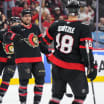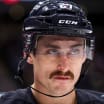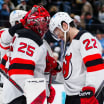Many contend Gordie Howe was the greatest of them all. The numbers back that up.
Whether it's his peak scoring years in Detroit, his incredible longevity or his dominance in the NHL, the World Hockey Association and international play, statistics are another perspective that confirm Howe's place as the greatest hockey player in history.
The player known as "Mr. Hockey" died Friday at age 88.
Numbers say Howe was the best ever
Statistical analysis confirms his place as the greatest player in hockey history
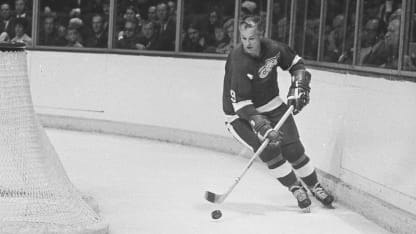
© Denis Brodeur/Getty Images
By
Rob Vollman / NHL.com Correspondent
When conducting a statistical analysis that spans two leagues and four decades, it can be challenging to objectively account for the different scoring levels and playing conditions to make a clear assessment of a player's total contributions. Fortunately, Howe's performance was so dominant that the end result remains clear: He was the best ever.
HOWE'S PEAK PERFORMANCE
The vast majority of Howe's career was spent with the Detroit Red Wings, who he played for from 1946-47 through 1970-71. His list of statistical achievements in those 25 seasons is outstanding.
Howe led the NHL in goals five times, was runner-up five times, and led the League in scoring six times. Howe won the Hart Trophy as NHL most valuable player six times and was a finalist six other times. Only Wayne Gretzky (nine) has won the Hart Trophy more often.
In the Stanley Cup Playoffs, Howe had 158 points in 154 games in that 25-season span; at the time of his first retirement, in 1971, that was second to Jean Beliveau's 176 points in 162 games. Howe led the playoffs in scoring six times and won the Stanley Cup four times.
When comparing Howe's statistics with those of other great players, it's important to consider that Howe didn't play in the NHL in the higher-scoring era between 1974-75 and 1992-93. The average number of goals a team scored in a game was below 3.00 in 23 of his 27 NHL seasons. On balance, the scoring rate was similar to today's scoring level of 2.7 goals per game.
For example, take the 1952-53 season, when Howe led the League with 49 goals and 95 points in 70 games at age 24. Those may not appear to be outstanding numbers at first glance, but each was at least one-third higher than those of the runner-up, linemate Ted Lindsay (32 goals, 71 points).
If that season were translated to the 4.0 goals per game that the average team scored in the 1981-82 season, Howe's 1952-53 totals would be the equivalent of 96 goals, 90 assists and 186 points in a full 82-game schedule. Furthermore, Howe achieved this in a six-team NHL, without the available talent being spread out among the 21 teams that competed in the 1981-82 season.
HOWE'S LONGEVITY
With Howe, it wasn't just the amazing peak level of scoring that he achieved, but his incredible longevity. He finished in the top five in NHL scoring for 20 consecutive seasons, from 1949-50 until 1968-69.
In 1968-69, Howe joined Bobby Hull and Phil Esposito as the first players to score 100 points; he did so at age 40.
The following season, at age 41, he was a First-Team All-Star for the 12th time. Only defenseman Ray Bourque (13 times) has been named a First-Team All-Star team more often. Howe was a Second-Team All-Star on nine occasions.
Howe played one more season before retiring from the NHL with 786 goals and 1,809 points in 1,687 games. At the time, that was a huge lead over Beliveau, who was second with 507 goals and 1,219 points in 1,125 games.
WORLD HOCKEY ASSOCIATION
If Howe's career had ended then, it would still have gone down as the greatest. But Howe came out of retirement in 1973-74 at age 45 to play with two sons, Marty Howe and Mark Howe, in the World Hockey Association.
Even in his late 40s, Howe continued to dominate the scoring race. In four seasons with the Houston Aeros and two with the New England Whalers, Howe scored 174 goals and had 508 points in 419 games; that's No. 7 all-time in WHA history.
Using Gabriel Desjardins' league translations system, Howe's WHA scoring totals convert to an estimated NHL equivalent of 373 points.
Link: http://hockeyanalytics.com/Research\files/League\Equivalencies.pdf
Howe was named a First-Team All-Star twice, led his team in scoring three times, and helped his team win the Avco Cup (the WHA's championship trophy) twice by scoring 28 goals and 71 points in 78 playoff games.
One of the highlights of this phase of Howe's career was representing Canada in the 1974 Summit Series against the Soviet Union. At age 46, a silver-haired Howe scored three goals and seven points in the eight-game series; the only players with more points were Bobby Hull (nine), Ralph Backstrom (eight), and Alexander Yakushev of the Soviet Union (eight).
HOWE'S FINAL SEASON
When the WHA merged with the NHL in 1979, Howe played one more season, with the Hartford Whalers.
Howe, who turned 52 late in the season, played all 80 games and competed in his 23rd All-Star Game; the game was played in Detroit, and the ovation he received when he stepped onto the ice at Joe Louis Arena was deafening. Howe finished the season with 41 points, outscoring 75 percent of the League's players.
Howe finished his career with 975 goals and 2,358 points in 2,186 combined NHL and WHA games.
Even when including WHA totals from players such as Mark Messier, European totals from players such as Jaromir Jagr of the Florida Panthers, and even Western Hockey League totals from players such as Guyle Fielder, Howe's career totals stand up as second all-time to Wayne Gretzky, who scored 940 goals and 2,967 points in 1,567 NHL and WHA games.
There are many ways to evaluate Howe's career. The numbers confirm that his peak scoring, durability and overall play in the NHL, the WHA, and international hockey make him the greatest hockey player of all time.
